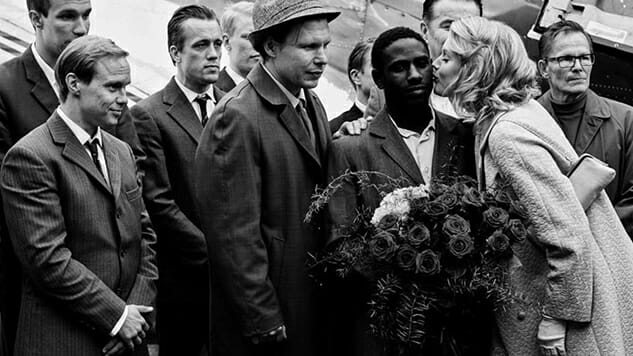The Happiest Day in the Life of Olli Mäki

Those who already know the story of Finnish boxer Olli Mäki will quickly realize the irony of the title of Juho Kuosmanen’s feature debut, The Happiest Day in the Life of Olli Mäki. Though Mäki (Jarkko Lahti) is a respected former athlete in his home country, Kuosmanen’s film focuses on one of his failures: his unsuccessful bid for the World Featherweight Title in 1962. The Happiest Day, however, suggests that the evening he unceremoniously lost in two rounds against American boxer Davey Moore was, in fact, a happy occasion for Mäki, as it signaled the end of two weeks of overwhelming media hype and pressure, thus allowing him to return to his quiet life in the small town of Kokkola, and especially to his new wife Raija (Oona Airola).
Snatching a romantic victory from the jaws of physical defeat? Sounds like yet another variation on Rocky, especially with Mäki being a working class fellow who gets a shot at a major title. But Kuosmanen’s film is, above all else, a thorough dismantling of standard boxing movie tropes and attitudes. That subversive nature of the film begins on the formal level: Shot in grainy black-and-white on 16mm, The Happiest Day commits utmost to an aesthetic of realism, with Kuosmanen and cinematographer Jani-Petteri Passi capturing scenes in detailed long takes and smooth tracking shots. There’s neither the overheated lyricism of Raging Bull nor the pulp grittiness of a noir like The Set-Up; everything in Kuosmanen’s film feels earthy and grounded, and, unlike Bill Conti’s work in Rocky, Kuosmanen forgoes a non-diegetic music score, thereby denying us any easy emotional signposts.
The Happiest Day also builds in its pointed takedown of genre tropes through its introduction of a meta-movie angle. As part of the lead-up to the World Featherweight Title match, a documentary crew is hired to capture Mäki during training sessions and in his personal life. This crew, however, is hardly interested in capturing the real Mäki, but instead in depicting him as Finland’s great national hope, a representative of the country on the world stage. Thus, we see the filmmakers manipulate events in order to make it look better for the cameras, directing Mäki, manager Elis Ask (Eero Milonoff) and others as if it were a fiction film. By devoting about as much screen time to this blatant bout of media manipulation as to Mäki himself, Kuosmanen indicates his desire to make us aware not only of the ways the media creates popular narratives out of these athletes’ lives, but of the kind of clichés such narratives enforce.